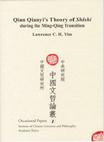錢謙益之「詩史」說與明清易鼎之際的遺民詩學Qian Qianyi’s Theory of Shishi during the Ming-Qing Transiti
作者:嚴志雄
Tag标签:无
内容概要
Qian Qianyi’s Theory of Shishi during the Ming-Qing Transition
Abstract
This study explores Qian Qianyi’s (1582-1664) vision for the poetics of Ming loyalism: shishi, “poet-historian” or “poetry-history.” Qian’s theory of shishi synthesizes paramount values of Chinese historiographical and poetic traditions. Although he draws heavily on ancient intellectual and literary precursors, his purpose is not to restore the values of antiquity. Qian strives, rather, to demarcate a poetic space for Ming loyalism, a space and value Qian no doubt desires to share with the Ming loyalists; and to devise, for this line of writing, a hermeneutic strategy for his contemporaries and posterity. We will expose elements of this theory in a close reading of an important essay that Qian wrote in 1656, “Hu Zhiguo shi xu” (Preface to Hu Zhiguo’s Poetry), and an examination of related literary, cultural and historical contexts. Despite its brevity, this essay is of great significance, critically and polemically, in the contexts of Ming poetics and the Ming-Qing dynastic transition. More specifically, it not only reflects the general literary temperament of the Ming remnants, but it also provides a critical apparatus with which to approach the kind of poetry Qian himself labored over in his later years, which became his most celebrated.
We argue that Qian’s essay can be seen as targeted at the Ming loyalists and their sympathizers, in their day and in the future. A promise to the loyalists and a guide to posterity, the message can be interpreted on three levels. First, it issues an assurance: Qian assures the Ming loyalists that posterity will remember them, through their writings, just as the Ming people remember the Song loyalists. It is meant to impress on every loyalist the urgent necessity to record. Second, there is a summons: Qian urges the Ming loyalists to write shishi, the most effective record of their times. Third, Qian offers a reading strategy for posterity: read between the lines to flesh out the Ming loyalists’ intent as embodied in those “subtle words.” For the loyalists, Qian’s promise is an immortality secured by writing a particular kind of verse, in a time when the loyalists were marginalized and had no authority except in the realm of literature. The writing of “Hu Zhiguo shi xu” might be an act of self-redemption on Qian’s part, too. Qian knew if he could inscribe his own name on the monument of the loyalists, posterity would form a more favorable impression of him, and save him from the disgrace he had to bear in his mortal life.
Keywords: Qian Qianyi poetics of Ming loyalism “Hu Zhiguo shi xu” shishi Ming-Qing transition
錢謙益之「詩史」說與明清易鼎之際的遺民詩學
中文提要
本文探論錢謙益 (1582-1664) 於明亡以後所倡之「詩史」說,剖析此一詩歌美學體系與明遺民情境之關係。錢氏詩史說之一大特色,端在結合中國史學傳統之褒貶觀與詩學傳統之美刺觀而為明遺民詩學點撥出一種「微言」式的修辭與喻意策略。就創作言,此一語言策略容許了抒情主體在詩篇中寄託一己之情思與乎經驗,亦賦予了載體在歷史記憶、政治及社會批評上重要的使命及功能。就詮釋言,具有詩史性格的詩篇要求讀者積極挖掘詩人於字裡行間所寄寓之情志與「大義」。本文將環繞錢謙益順治十三年 (1656) 所撰〈胡致果詩序〉一文展開論述,探究詩史與中國傳統史學、經學、詩學之關係,追蹤詩史在唐代、宋代、宋元之際及明代所歷經的發展,最後聚焦於明清易鼎之際的歷史、政治情勢及明遺民詩人的創作特色與集體訴求。錢氏〈胡致果詩序〉一文篇幅雖不長,卻是探論明遺民詩學與情境的重要文獻,藉之並可進窺錢氏晚年所作詩文的企圖與成就。
本文認為,錢氏〈胡致果詩序〉的讀者對象為明朝遺民及當時後世同情於遺民的文士。明清改朝換代之際,明遺民被逼或自願處於政治權力之外,特立獨行,其抱持者,為對前朝的記憶、認同與自我的價值、信念。詩史為一「見證」及「存在」美學,遺民藉之可將當代重要歷史、政治事件及己身之遭際、感慨筆之於文,傳之於世。而史學傳統的褒貶觀及詩學傳統的美刺觀在中國文化中地位崇高,亦為此時此地的書寫行動注入了超越實際政權的強韌力量。由是觀之,「立言」一途,亦可「不朽」,歌詩一藝,不能以小技目之。詩史於此端,遂亦具有對抗政治、命運的深沉意味。政權轉移之際,形勢險危。錢氏詩史說主微言大義,無異提供一種較為隱晦的修辭策略,在語犯時忌的陰影下,詩史性的書寫或多或少發揮著一種保障的功能。錢謙益的詩史說緊扣遺民處境建立,且述說之際,儼然以遺民自居。這也許是一種建構「意欲形象」的努力。世人咸知,錢氏身事明清二朝,為「貳臣」。錢氏通過詩史論述而以遺民形象出現,或欲洗刷其「貳臣」的歷史污點?或欲賦其未遂之志?
關鍵詞:錢謙益 明遺民詩學 〈胡致果詩序〉 詩史 明清之際
作者简介
嚴志雄 美國耶魯大學博士(1998年),現任中央研究院中國文哲研究所助研究員,研究領域:明清文學。
图书封面
图书标签Tags
无
评论、评分、阅读与下载
